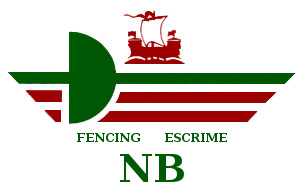Your Child’s First Tournament
First Tournament (or Things a Parent Might Want to Know)
Your fencer thinks it’s time to enter a tournament and now you are responsible to help them prepare.
What does it all mean?
First there is registration – why the early date? The organizers need to prepare for the number of participants and arrange for resources like referees. Fencers’ information is set up in advance so creating the order of matches is done quickly and the fencing can begin earlier.
Which event should my fencer enter ? If they have chosen an individual competition, there will be a choice of weapons – foil, epee or sabre. Confirm with their coach as to which weapon your fencer has been training. There are also standard age categories. Open or senior events have no age restriction and involve the most experienced competitors. Junior events are restricted to fencers who are under 20 years old on January 1st of the current fencing season. Cadet events are restricted to fencers who are under 17 years old on January 1st of the current season and likewise for under 15 and under 13 events.
What is provincial competitive membership? Our provincial organization, Fencing Escrime NB, owns most of the scoring equipment used at tournaments so fees go to supporting fencing across the province. What’s a CFF license number? Competitive membership in FENB automatically registers our fencers with the Canadian Fencing Federation. The number helps track a fencer’s results in tournaments. Knowing the number is not required at this stage.
What about the required equipment? If your fencer uses club gear, you must arrange to borrow all the pieces necessary to compete. The coach will advise your fencer on the type of clothing and equipment they need.
What should you prepare before you go? In addition to the required competition clothing & equipment, a water bottle and energy snacks are good. If your fencer is at the event over mealtime, you may need to take advantage of the canteen, if there is one. There will probably be a limited selection, so plan accordingly. You know your fencer.
What does check-in mean and why does it matter? It’s important to make certain people are registered in the correct event. The deadline is important for getting things started on time so don’t arrive at the last minute. Fencers need to complete check-in at the times specified for each event they’ve entered. It confirms that they are present and ready to fence. At closing time, the information goes to people who organize the order of the bouts, called the secretariat. A list is posted or called showing all fencers who will be in the event. Your fencer should find his/her name there.
So check-in time has ended. Why is nothing happening? Right now, secretariat people know who is here for the event and fencers are being structured into balanced groups, called pools. Rankings from fencers’ previous tournaments are used to create these pools. Use this time to find a place for their bag, get changed into fencing clothing, get their equipment ready. Your fencer will also need to report at the armourer’s table to pass an equipment check. Then it’s time for the fencers to warm up in preparation to compete. When it’s time to start the competition, the floor manager or a referee will call fencers’ names.
It’s almost lunchtime. When do they eat? Good question because it’s not obvious. Once the event pool is started, fencers are expected to stay at their designated fencing area (piste). They need the referee’s permission to leave. They will fence all other fencers in their pool. It’s probably a good idea to take a water bottle with them. After pools, the results of all the fencers in the event are recorded. It is while this is happening that there is time for a quick bite.
Are spectators welcome near the piste? This depends on how tight the layout is. It is probably okay as long as you are out the way of the fencers and the referee, who walks back and forth with the competing fencers. Also, you need to be sensitive to your fencer’s wishes.
When will my fencer be finished? After the initial pools, depending upon their age category, fencers may move on to an elimination round, often referred to as DE’s (direct elimination). Your fencer has at least one more match and will be called when his/her turn comes. At this stage usually only the winners advance to fence again. The crowd starts to thin now because fencers often leave after being eliminated. If there is no elimination round, the next thing that happens is the awarding of medals for the event.
The regional fencing scene is not that big. Fencers will meet each other again and other parents will begin to look familiar to you as you attend more tournaments. Good sportsmanship is very important to fencing. Help your fencer to focus on technique and points, not just on winning, and they’ll enjoy their experience. And so, hopefully, will you!
Prepared by: Lee McLean, Damocles Fencing Club

